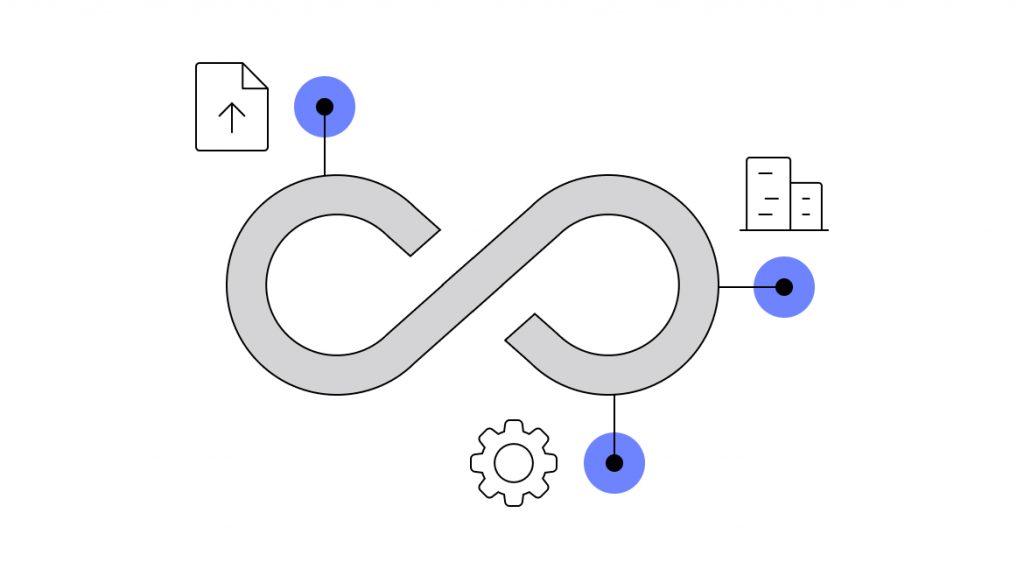Contents
To succeed in ecommerce, you need to deliver products instantly and keep them updated. A website’s flexibility and usability must keep pace with new trends. In response to this, developers are faced with a daunting challenge: adding new features and functions to their websites and applications. To accomplish all of this, the quality of service must not be compromised.
It is possible to facilitate ecommerce DevOps implementation in different ways. Ecommerce development projects can be more productive by Devops implementation for ecommerce. By bridging the gap between developers and management departments, DevOps eliminate clots in deployment processes and make the development and release process to be more dynamic. Continue reading to see more of the implementation benefits DevOps can offer ecommerce businesses.
DevOps Overview
To boost efficiency and increase the delivery of applications and services, DevOps practices combine cultural values, lifecycle approaches, and tools.
Building technical and personal cooperation begins by challenging silos and the ‘us and them mentality, which aligns perfectly with the core philosophy of a forward-thinking DevOps consulting company.
Why Use DevOps in Ecommerce
Utilizing DevOps in ecommerce is primarily beneficial for increasing the overall effectiveness of development projects. The productivity is measured by counting the growth in output over time used by the development team for quality checks and deployments. DevOps has several advantages over traditional methods, including the following:
1. Transformation and innovation
With DevOps, innovative solutions can be deployed faster. Businesses can create new features and upgrades faster than their competitors. A sequential process is followed during every phase of the creation process. With DevOps, all phases of the traditional SDLC are connected. Through interconnection between Development and Operations, new updates are released at a steady pace and without any quality or speed impacts.
2. Breaking down departmental barriers
The introduction of the DevOps methodology has the major advantage of reducing the clot in the process of deployment by breaking down the wall between IT and operations. In place of the traditional process of one department completing all the tasks of a project before handing it over to the other (process handover), a new system of collaboration is implemented. System deployment and development become more dynamic as a result.
3. Higher level of customer satisfaction
Increasing productivity and improving software delivery is the ultimate goal of DevOps. This means being able to handle a high number of amendments with ease. Every digital medium must provide an exceptional customer experience. With DevOps, new, bug-free features can be delivered promptly.
4. Responsiveness to ever-changing demands
Agile cultures are enabled by DevOps. Using its tools and practices, there is a reduction in the time it takes from whiteboard to production. By allowing them to roll out new features to their customers at a much higher frequency, ecommerce businesses can accelerate go-to-market. DevOps’ adaptation and implementation are like shaking hands with speed.
Best Practices of DevOps for Ecommerce Projects

Below we describe that by choosing DevOps ecommerce companies can avoid many common challenges.
Continual integration and delivery
The pace and agility of their business are driven by progressive platforms. The key to staying afloat is keeping pace with rapidly changing customer needs. The proper design of CI/CD pipelines enables the receiving of customer feedback, the analysis of that feedback, and the rapid enhancement of the product.
A CI/CD pipeline provides many benefits, namely:
- Due to the hundreds of automated tests running in a few seconds, fewer bugs leak into production. A team of QA specialists is working on improving the global product.
- More frequent releases and updates are possible.
- The release does not require pausing development.
- Even small changes are automated.
- When small batches of changes are deployed, there is less risk if something goes wrong. In this way, developers are less stressed during release.
Automation of infrastructure
Manual processes contradict DevOps principles and can cause unexpected failures, lead to lost money, and negatively impact customer loyalty while services remain unavailable.
An intelligent approach to infrastructure automation achieves the following:
- Faster changes – you can make those changes automatically within a few seconds.
- Infrastructure modernization – you can accelerate your business with contemporary tools.
- Measurable results – you can analyze data for further enhancements and see how your ecommerce project performs.
- Managing development teams‘ time efficiently. Due to the automated infrastructure, the IT department can spend more time improving the system rather than maintaining it.
- There is a decrease in human error.
- Maintaining infrastructure at a reduced cost.
It is important to remember that the goal of automation and implementation for DevOps in ecommerce is to set up stable and consistent builds. Automating everything is not a smart approach to automation.
Read also: 7 Best DevOps Automation Tools
E-commerce security
Data must be properly stored, processed, and protected for online stores to serve their clients. Furthermore, companies have to build infrastructure that meets GDPR requirements (particularly for those who keep customer information and banking information). Therefore, DevOps practices contribute to creating a secure environment from the beginning.
Here is a shortlist of points to consider when designing a secure online merchant project:
- It is crucial that the servers are configured and updated automatically.
- Backups should be created regularly.
- Configure SSL and TLS correctly.
- Role designation and restricted access to the resources.
- Encrypting sensitive data (such as bank details or personal information) is mandatory.
- Configurations for SSH are all hardened.
- Each application is isolated.
- Store logs related to infrastructure and applications in a safe place.
- The vulnerability of the code is checked regularly to ensure its security (SAST).
- DDoS attacks are handled properly by the service.
- A two-factor authentication policy is in place.
Alerts and monitoring
For measuring the performance and quality of the website, IT staff needs analytics tools. A positive user experience depends on three metrics: availability, functionality, and speed.
Online merchant businesses should make use of monitoring and notification tools as part of their DevOps practices. These tools provide you with:
- Sends an alert when an undesirable event interferes with the operation of the system. It allows you to eliminate issues before they affect the availability of the service.
- Monitoring tools are essential for setting up auto-scaling and load balancing.
- Predicting traffic spikes and preparing infrastructure for them is made easier with automated decisions.
To see what impact infrastructure performance may have on end-users, companies monitor metrics and logs. Not only are monitoring and alerting essential for tracking and analyzing data, but they are also crucial for preventing issues for your customers.
Creating a DevOps Culture in Your Organization

The DevOps model refers to a change in technologies as well as in the culture of their creation, adaptation, and use. A DevOps initiative utilizes automated techniques for deployment, setting up environments, configuring, monitoring, and testing to create and support applications.
There are two classic directions for turning to DevOps:
- The plan should consist of actions that lead to improvements in cultural, process, and organizational changes, in large part through the introduction of a cross-functional product team format and a set of competencies necessary for the teams to create value according to the product’s profile and requirements.
- The introduction of CI/CD tools for automating changes to functionality when deploying to the desired environments is a technology upgrade.
Setting up closer contacts between developers and system administrators is the first step in implementing DevOps for ecommerce. A mutual goal should be to show the generated code as quickly as possible and implement it as quickly as possible. This requires at least some knowledge of continuous integration and deployment tools like GitLab CI, Jenkins, Teamcity, or their cloud counterparts.
DevOps best practices should be built into a company from scratch, and a dedicated team should be formed to build a cohesive corporate DevOps platform. As a result, product teams can enter their own code and have the necessary action plan provided within the framework of the platform concerning their development goals.
Discover more about DevOps Outsourcing Services at IT Outposts.
The DevOps platform is developed by specialists who provide the necessary support for product teams. A product team’s feedback about DevOps projects allows an organization to form a better service and expand its functionality.
Conclusion
It is projected that the ecommerce market will grow dramatically and evolve faster than any other industry.
There is a lot of competition, and customers are becoming more demanding because of the abundance of options available. To gain credibility, companies need to provide high-quality online services that are continuously improved.
Slow-moving development has no place in the modern world. DevOps best practices allow you to respond quickly to market demands, optimize spending on IT system maintenance, establish a flexible and scalable architecture suitable for quick updates, and enhance collaboration between teams.
Feel free to ask IT Outposts any questions you might have about DevOps. Providing DevOps services to small and large businesses is what we do the best.

I am an IT professional with over 10 years of experience. My career trajectory is closely tied to strategic business development, sales expansion, and the structuring of marketing strategies.
Throughout my journey, I have successfully executed and applied numerous strategic approaches that have driven business growth and fortified competitive positions. An integral part of my experience lies in effective business process management, which, in turn, facilitated the adept coordination of cross-functional teams and the attainment of remarkable outcomes.
I take pride in my contributions to the IT sector’s advancement and look forward to exchanging experiences and ideas with professionals who share my passion for innovation and success.